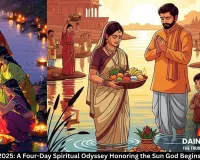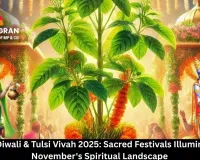Dev Utni Gyaras 2025: A Sacred Awakening and Celebration of Light
Digital Desk
.jpg)
Dev Utni Gyaras, also known as Prabodhini Ekadashi, is set to be observed on November 1, 2025, marking a significant awakening in the Hindu spiritual calendar. This festival, whose name translates to "God's Eleventh," signifies the end of the four-month Chaturmas period when deities are believed to sleep, and the joyful return of the gods to their active, watchful states. For millions of devotees, this day heralds a period of spiritual renewal, auspicious beginnings, and profound cultural celebration.
The Significance of the Awakening
Falling on the eleventh day (Ekadashi) of the bright half of the lunar month of Kartik, Dev Utni Gyaras holds deep religious importance. It is widely believed that on this day, Lord Vishnu awakens after a four-month rest on the Sheshnag serpent. This celestial awakening opens the gates to all auspicious activities—weddings, housewarmings, and new business ventures—that are traditionally avoided during the Chaturmas period .
The festival also heralds the start of the wedding season in India and is closely linked to the end of the monsoon and the beginning of the harvest season. For the farming community, it is a time of thanksgiving and celebration, coinciding with the vibrant festivities of Diwali, the festival of lights, which occurs just a few weeks prior .
Rituals and Observances
Devotees observe this sacred day with a range of spiritual practices aimed at purification and devotion. Many undertake holy baths in sacred rivers like the Ganges, Yamuna, and Godavari before sunrise, a ritual believed to wash away sins and bring spiritual merit. Fasting is a common observance, with devotees abstaining from certain grains and foods to purify the body and mind.
A central ritual involves the symbolic marriage of the Tulsi plant (Holy Basil) to Lord Vishnu. The Tulsi plant is revered in Hindu households, and this ceremony, performed with Vedic hymns and offerings, symbolizes the divine union and devotion. Homes and temples are decorated with lights, rangoli, and flowers, creating an atmosphere of joy and celebration. Charity is another cornerstone of the observance, with devotees donating food, clothes, and essentials to the needy, embodying the spirit of selflessness and compassion.
Contemporary Relevance and Global Observance
In today's fast-paced world, Dev Utni Gyaras offers a meaningful pause for spiritual reflection and reconnection with cultural roots. Its emphasis on environmental reverence—through the veneration of the Tulsi plant and sacred rivers—resonates strongly with modern ecological values, highlighting the timeless wisdom embedded in Hindu traditions.
The festival's message of awakening, purity, and new beginnings transcends geographical boundaries. As Hindu communities have spread across the globe, celebrations of Dev Utni Gyaras can now be found in North America, Europe, and Australia, often adapted to local contexts while preserving core spiritual elements. This global observance not only strengthens cultural identity but also fosters interfaith understanding as others are invited to learn about its rich symbolism.
A Unifying Celebration
Beyond its theological significance, Dev Utni Gyaras serves as a powerful social adhesive, bringing families and communities together in shared celebration. It reinforces values of righteousness, compassion, and environmental stewardship that remain as relevant today as in ancient times. As the world continues to navigate complex challenges, this ancient festival offers a timeless message of hope, renewal, and the eternal victory of light over darkness—a spiritual awakening that calls humanity toward greater harmony and peace.











